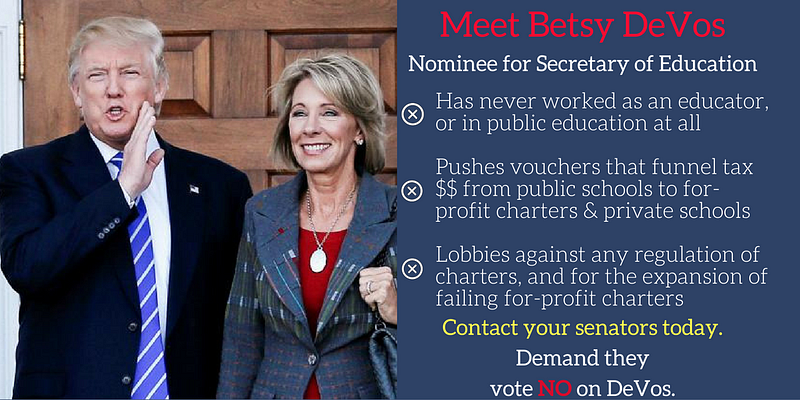The 5 Most Infuriating Moments from Betsy DeVos’ Confirmation Hearing
You’ll want to call your senator after reading this.

If you care about public education, you probably heard about Betsy DeVos’ train wreck of a confirmation hearing for Secretary of Education last night.
If you haven’t called your senator yet at 1–855–882–6229 to tell them to vote NO on DeVos, this list of 5 lowlights from her confirmation hearing should make you run straight for your phone.
1. DeVos refuses to say she won’t privatize schools or cut public school funding.
Even a cursory look at the impact of her pervasive influence in Michigan (built on hundreds of millions of dollars in political contributions) shows that we should run away as fast as we can from her vision of deeply cutting and privatizing schools.
As reported by Politico, “Michigan’s laissez-faire attitude about charter-school regulation has led to marginal and, in some cases, terrible schools in the state’s poorest communities as part of a system dominated by for-profit operators.”
At her hearing yesterday, DeVos doubled down on her failed approach, refusing to say she would not cut public school funding or privatize schools.
2. DeVos is ok with guns in schools, because grizzly bears.
This actually happened. DeVos also said she is fine with President-elect Trump’s reckless, dangerous plan to get rid of gun-free school zones.
3. DeVos doesn’t know the difference between proficiency and growth.
Proficiency — whether students can achieve at a certain level — and growth — the amount of progress students have made — are two of the most basic and fundamental concepts of education policy. They affect how schools are judged and underpin the debates around the Every Student Succeeds Act and No Child Left Behind before it.
But when Sen. Al Franken asked DeVos for her take on the debate, she clearly didn’t know what he was talking about. See for yourself:
4. DeVos says states should decide whether to comply with the federal Individuals with Disabilities Education Act.
As the Washington Post reported, DeVos “displayed at best confusion and at worst a lack of knowledge about a key federal law involving students with disabilities.” For those unfamiliar with this critical civil rights legislation (including, apparently, DeVos), IDEA protects services for children with disabilities, including early intervention and special education.
DeVos later clarified that she doesn’t actually know what she’s talking about here, admitting to having “confused it.”
5. DeVos says charter schools and public schools should not be held equally accountable.
This is apparently built on her experience in Detroit, where she fought vociferously against even basic accountability for charter schools and created “unregulated competition [that] pushed [public] schools into near-unrecoverable insolvency and allowed dubious for-profit charter operators to prosper without establishing a track record of better outcomes for students,” according to a Vice News report.

